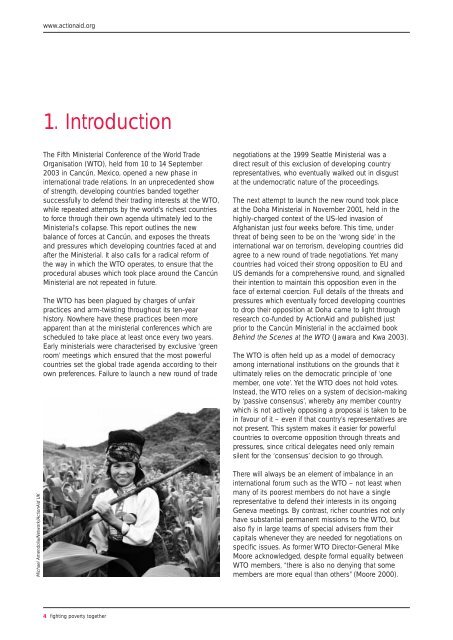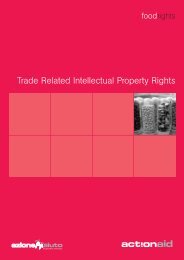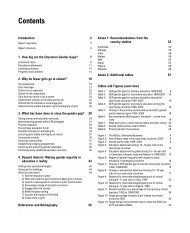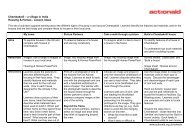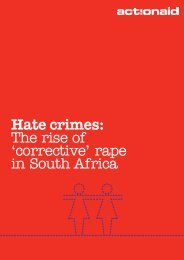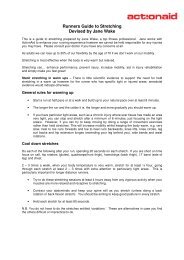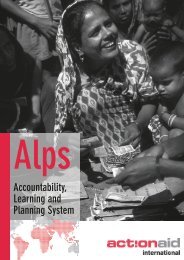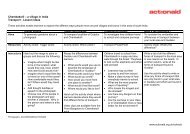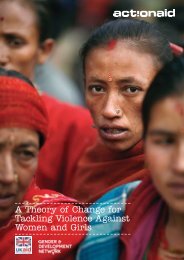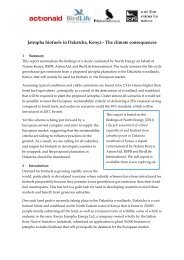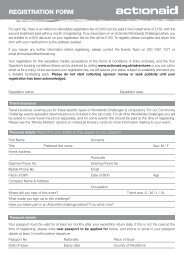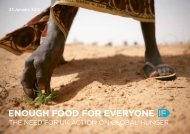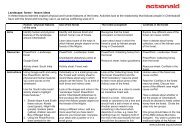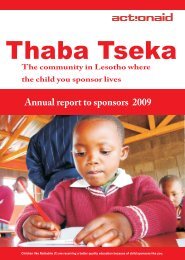Divide and Rule: - ActionAid
Divide and Rule: - ActionAid
Divide and Rule: - ActionAid
Create successful ePaper yourself
Turn your PDF publications into a flip-book with our unique Google optimized e-Paper software.
www.actionaid.org1. IntroductionThe Fifth Ministerial Conference of the World TradeOrganisation (WTO), held from 10 to 14 September2003 in Cancún, Mexico, opened a new phase ininternational trade relations. In an unprecedented showof strength, developing countries b<strong>and</strong>ed togethersuccessfully to defend their trading interests at the WTO,while repeated attempts by the world’s richest countriesto force through their own agenda ultimately led to theMinisterial’s collapse. This report outlines the newbalance of forces at Cancún, <strong>and</strong> exposes the threats<strong>and</strong> pressures which developing countries faced at <strong>and</strong>after the Ministerial. It also calls for a radical reform ofthe way in which the WTO operates, to ensure that theprocedural abuses which took place around the CancúnMinisterial are not repeated in future.The WTO has been plagued by charges of unfairpractices <strong>and</strong> arm-twisting throughout its ten-yearhistory. Nowhere have these practices been moreapparent than at the ministerial conferences which arescheduled to take place at least once every two years.Early ministerials were characterised by exclusive ‘greenroom’ meetings which ensured that the most powerfulcountries set the global trade agenda according to theirown preferences. Failure to launch a new round of tradenegotiations at the 1999 Seattle Ministerial was adirect result of this exclusion of developing countryrepresentatives, who eventually walked out in disgustat the undemocratic nature of the proceedings.The next attempt to launch the new round took placeat the Doha Ministerial in November 2001, held in thehighly-charged context of the US-led invasion ofAfghanistan just four weeks before. This time, underthreat of being seen to be on the ‘wrong side’ in theinternational war on terrorism, developing countries didagree to a new round of trade negotiations. Yet manycountries had voiced their strong opposition to EU <strong>and</strong>US dem<strong>and</strong>s for a comprehensive round, <strong>and</strong> signalledtheir intention to maintain this opposition even in theface of external coercion. Full details of the threats <strong>and</strong>pressures which eventually forced developing countriesto drop their opposition at Doha came to light throughresearch co-funded by <strong>ActionAid</strong> <strong>and</strong> published justprior to the Cancún Ministerial in the acclaimed bookBehind the Scenes at the WTO (Jawara <strong>and</strong> Kwa 2003).The WTO is often held up as a model of democracyamong international institutions on the grounds that itultimately relies on the democratic principle of ‘onemember, one vote’. Yet the WTO does not hold votes.Instead, the WTO relies on a system of decision-makingby ‘passive consensus’, whereby any member countrywhich is not actively opposing a proposal is taken to bein favour of it – even if that country’s representatives arenot present. This system makes it easier for powerfulcountries to overcome opposition through threats <strong>and</strong>pressures, since critical delegates need only remainsilent for the ‘consensus’ decision to go through.Michael Amendolia/Network/<strong>ActionAid</strong> UKThere will always be an element of imbalance in aninternational forum such as the WTO – not least whenmany of its poorest members do not have a singlerepresentative to defend their interests in its ongoingGeneva meetings. By contrast, richer countries not onlyhave substantial permanent missions to the WTO, butalso fly in large teams of special advisers from theircapitals whenever they are needed for negotiations onspecific issues. As former WTO Director-General MikeMoore acknowledged, despite formal equality betweenWTO members, “there is also no denying that somemembers are more equal than others” (Moore 2000).4 fighting poverty together


